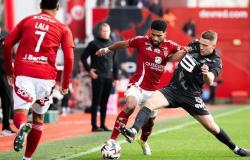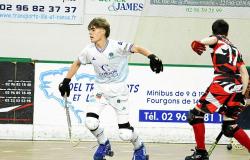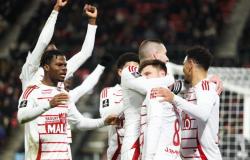
“The profession of recruiter is not very well known, nor very recognized, but it seems to me to be fundamental. According to Arsène Wenger, it’s almost the most important position, because if you miss two transfer periods in a row, you put the club on the ground. The Stade Brestois recruitment unit, which meets face-to-face every month and a half, exceptionally opened its doors to us recently. Around the table, in one of the meeting rooms at the club’s headquarters, sports director Grégory Lorenzi is accompanied by three trusted men: Emmanuel Pascal, Yannick Lorenzi and Thierry Bonalair, author of this blunt introduction.
In the not-so-distant past, Grégory Lorenzi was the only one to travel the grounds, the only one to close the deals. “For three years, I did this on my own with my feelings and my network, while integrating the technical staff,” he explains. But when we moved up to Ligue 1, there was an ambition to want to grow, without having a disproportionate cell either because I want to involve everyone.” The first to join him were his brother, Yannick, and former professional player Thierry Bonalair, in the summer of 2019, “a mixture of experience and youth”. Former deputy of Jean-Marc Furlan, Emmanuel Pascal in turn joined the project in 2022 “to centralize data and reports”.
“Between 800 and 1,000 matches per year”
The watchword of this team is “the field, because nothing replaces it”, thunders Grégory Lorenzi, not necessarily opposed to the data “which allows us to clarify a vision on two players with a similar profile, but which will say nothing about state of mind or behavior. So the cell moves every weekend, up and down hill. “We must see between 800 and 1,000 matches per year. Sometimes on video, to rough it up, but primarily on site,” they calculate together.
But how does it really work? “At the end of the summer transfer window, we take stock of the positions where we might have needs,” begins Grégory Lorenzi. From September to December, we target France, Belgium, the Netherlands, Scandinavia and Switzerland. The guys organize themselves, they rotate, it’s up to them to go and find it. Afterwards, I find out if so and so is compatible with Brest, in mentality or financial aspect. From January to March, we open up to other championships like Portugal, he continues. At the same time, we are emphasizing the individualization of the players we noticed during the first four months.”
-“Be decision-makers, not be cutesy”
“We are uncertainty reducers. We must also be decision-makers, not be cutesy. “It’s not bad”, it doesn’t mean anything,” explain the three recruiters. “When I’m thinking about a key position, I need to be able to ask them, “Guys, who should we do?” “, further assures Grégory Lorenzi. I need answers. So at the end of May, we establish a hierarchy. In this position, him in 1, him in 2, him in 3…” “The objective is to avoid “panic-buying”. June, July and August are the consecration of the work that has been done upstream,” assures Yannick Lorenzi. Because for his eldest, “the hardest part of the job is to anticipate”. To reduce a risk inherent in recruitment, Grégory Lorenzi and his close guard developed software internally a year and a half ago. “I asked Manu (Emmanuel Pascal) to work on something that could save us time,” confides Grégory Lorenzi. Everyone has the application on their cell phone and can enter data on the players observed from the stadium. The scout provides information about the match, the playing conditions, the quality of the match, the game system, etc. Then we defined color codes. A green point, a player has marked you and we estimate that we can recruit him if he has three. Yellow, to see again. Mauve, we didn’t see anything interesting.”
Sometimes it works, sometimes it breaks
For Emmanuel Pascal, “football is so volatile and random that if you don’t do your best, it falls apart in your hands. I am convinced of it because at Auxerre (where he was until 2022) we were torpedoed by the transfer window. Afterwards, there is always an element of uncertainty. Luciano Castan, when we take him in Brest in 2016, he has never left Brazil, and it works. Sometimes you move another one 50 kilometers, and it doesn’t work…” “The economic context is also important,” concludes Grégory Lorenzi. There are players we can’t play, so we adapt. We can try bets, always to a lesser extent. But if you buy a player for 4-5 million and he doesn’t perform, for Brest, it’s catastrophic. We have to make decisions. And take responsibility for our choices.”





